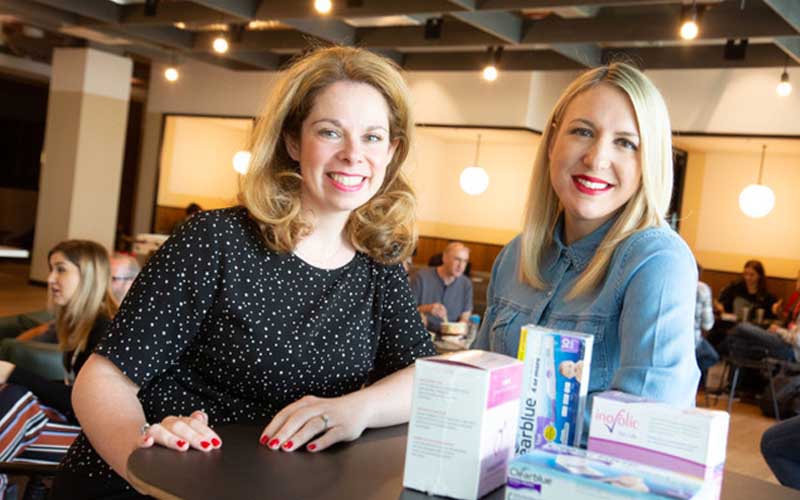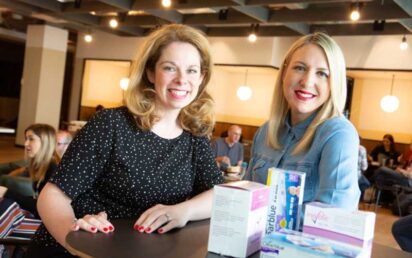The story of Dr Fertility sounds like a script to a Bridget Jones movie.
Dr Lucy Buckley and Kobi McCardle were two 30-something best friends living in an attic flat in Manchester when they identified a gap in the market for fertility support.
Both were single, career-focused women, and after seeing friends and family struggle to conceive, resolved to help people on their fertility journey.
One in seven couples in the UK are affected by infertility and the friends identified a need for a trusted one-stop shop for everything people might need throughout their fertility journey.
After meeting their husbands through internet dating and getting married within six months of each other, they had their first babies four weeks apart in 2017.
It was while they were on maternity leave that they decided to launch Dr Fertility. In between looking after their babies, the entrepreneurs would field customer services queries and pack as many parcels as possible into the pram and head to the local post office to send them to customers.
Investors loved their story and purpose as they raised £2.6 million in their first two funding rounds and helped countless people overcome their own infertility hurdles.
After receiving accreditation from the Care Quality Commission (CQC), Dr Fertility transitioned from an eCommerce business, offering products and expert educational content, to a digital healthcare business that provided earlier and easy access to expert fertility support.
The Dr Fertility platform allowed people to book an online consultation with a fertility doctor or nurse of their choice, conduct home diagnostic testing and access emotional support via coaching from qualified nurses.
Dr Fertility had been tipped for big things but last year the business quietly went into liquidation. Today McCardle is working as a fractional chief marketing officer, while Buckley is preparing to launch a new healthcare consultancy. Despite the challenges, the two remain best friends.
Buckley stated: “The last few years have been very challenging for Kobi and I, but we’ve come out the other side now. We hope our story will help other entrepreneurs who may be facing similar challenges.
“Dr Fertility was our ‘third child’. It was heart-breaking to have to close the business.”
McCardle added: “The reality is that starting and scaling a startup is tough. In fact, research shows that only 40% of of high-growth potential companies which have raised equity finance go on to scale and exit within eight years.
“The other 60% either fail, are stagnant or yet to exit. That’s why investors of early stage businesses are often looking for 10x their investment due to the ratio of successful to unsuccessful investments.
“Lucy and I learnt a lot from the experience, and it definitely showed us how resilient we are. We are now passionate about sharing this knowledge with other founders through our consultancy work.”
Buckley continued: “There’s no doubt the funding landscape changed after Covid and it became harder to raise money. The fact that a few high-profile digital health companies were struggling didn’t help with investor confidence in the sector either. There were a lot of people sitting on the fence.
“Of course, with hindsight, there are things we’d do differently but I don’t see it as a failure.”
Their story began when the two co-founders were sharing a flat in Manchester and lost count of the number of insensitive comments they received about their ‘ticking biological clocks’.
They also witnessed their friends and family feeling anxious and stressed when they did not conceive straight away.
Buckley said: “We thought ‘actually, where do you go to find out more about fertility?’ and the seed for Dr Fertility was planted. With my background in healthcare and Kobi’s background in digital marketing and eCommerce, we believed we had the right combination of skills to make it a success.”
The idea never went away, and they launched Dr Fertility in 2017 while on maternity leave with the aim of supporting people on their path to parenthood.
The idea quickly gained traction – reporting 270% growth in revenue – and in June 2019, Dr Fertility raised £900,000 from Praetura Ventures as part of a £1m seed round.
The money helped them grow their team and develop a digital health platform to offer more personalised healthcare.
In 2021 they raised a further £1.6m through Praetura and GMCA.
“For the first three years we had constant growth and excitement, followed by two years of what I now call the ‘messy middle’,” explained McCardle at a TechBlast roundtable in 2022.
“I think business is like a game of snakes and ladders full of highs and lows. One day you’re like ‘yeah’ and the next day it’s ‘nooooo’.”
The £1.6m investment helped them transition into a digital heath business after receiving accreditation from the Care Quality Commission (CQC).
Buckley said: “We were the first digital primary care provider for fertility to be registered with the Care Quality Commission and to be approved by the Organisation for the Review of Care and Health Applications (ORCHA), providing external validation of our quality standards.”
Dr Fertility moved in offices in the Manchester’s Bonded Warehouse and its workforce peaked at 13 staff. In 2022 Dr Fertility embarked on their third fundraise and say the landscape had changed.
“The one thing you can never do in healthcare is cut corners when dealing with patients and we never did,” recalled Buckley.
“We were looking to raise £1m in our third raise to scale and grow the business.
“I think a lot of people underestimated the impact of Covid. The funding landscape changed and then you had things like the Silicon Valley Bank collapse. It was harder.
“It’s easy to blame investors but we were lucky with ours. Praetura were brilliant and very supportive. We wouldn’t say a bad word about them.”
The final straw came when an angel investor Dr Fertility had been talking to pulled out at the 11th hour.
Buckley recalled: “You experience a mix of emotions. It was heart-breaking and we were exhausted.
“The sad reality is it didn’t work out but we have some incredible learnings along the way.
“Kobi and I remain best friends and we’ve stuck together like glue.”
Statistically only 2% of VC funding going to female founders but neither Buckley or McCardle blame this for why they couldn’t raise additional investment.
“I’m passionate about helping women to raise funding,” said McCardle. “I’m working as a fractional CMO but I’m also exploring way I can support female founders with raising investment as well.”
In total Dr Fertility generated £2.5m in revenue during its lifespan, achieved a TrustPilot score of 4.8/5 and served 68,593 customers.
The only figure they don’t know is exactly how many babies were born as a result of Dr Fertility…

